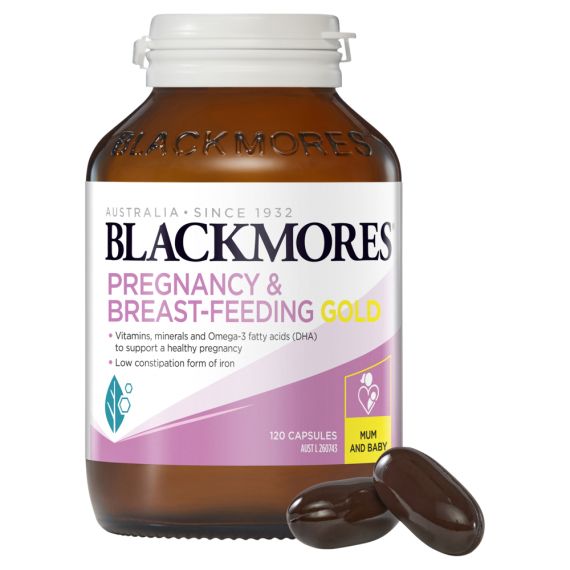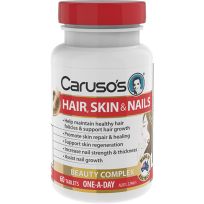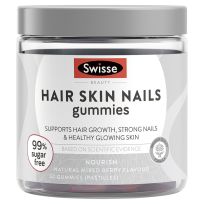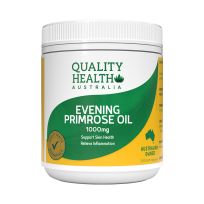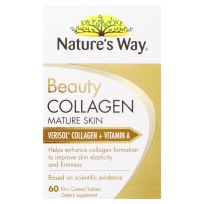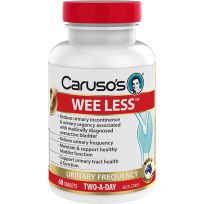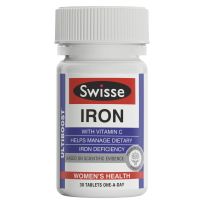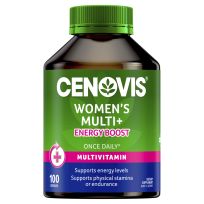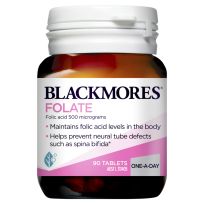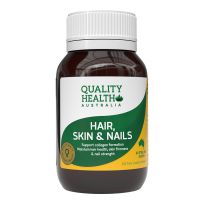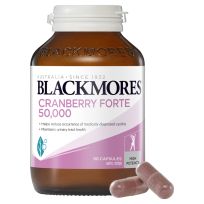Blackmores Pregnancy & Breast-Feeding Gold 120 Capsules
Formulated with essential nutrients for mother and baby
$
41
.99
$
18
.00
off RRP
Help provide nutrients for a healthy pregnancy for mum and bub. Blackmores Pregnancy and Breast-Feeding Gold capsules are formulated to provide the nutrient requirements for pregnant and breast-feeding women. This dietary breast-feeding supplement provides 20 important nutrients for mother including folic acid, iodine and vitamin D3, with supporting nutrients for baby. It also contains omega-3 DHA to support your babya€™s brain and nervous system development, and a lower constipation form of iron which is gentle on the digestive system.
Concentrated omega-3 triglycerides fish 250 mg containing omega-3 marine triglycerides 150 mg Fish oil containing omega-3 marine triglycerides 150 mg as: Docosahexaenoic acid (DHA) 125 mg Eicosapentaenoic acid (EPA) 25 mg Nicotinamide 9 mg Nicotinamide Also called niacin; nicotinamide (vitamin B3) is a water-soluble nutrient involved in energy production and carbohydrate metabolism. Legumes, peanuts, wheat bran, and fish are all sources of vitamin B3. Ascorbic acid (vitamin C) 30 mg Vitamin C Ascorbic acid (vitamin C) is a water-soluble antioxidant nutrient involved in many biological processes in the body. Vitamin C is found in a number of fruits and vegetables, great sources are capsicums, blackcurrants, oranges and strawberries. Calcium carbonate (calcium 50 mg) 125 mg Biotin 15 Aµg Biotin Biotin is a water-soluble nutrient belonging to the B group vitamins. Food sources of biotin include cheese, cauliflower and eggs. Iron (II) glycinate (iron 5 mg) 19.22 mg Iron Iron is an essential mineral and an important component of proteins, such as haemoglobin, involved in oxygen transport and metabolism. Iron containing foods include lean red meat, poultry, fish, oysters, dried fruit, legumes, beetroot, whole grains and tofu. Zinc oxide (zinc 5.5 mg) 6.82 mg Zinc Zinc is an essential trace element that plays a role in every living cell in the body. There are also around 300 enzymes that need zinc for healthy function. Zinc containing foods include meat, eggs, seafood- especially oysters, whole grains and seeds. Magnesium oxide-heavy (magnesium 35 mg) 58.1 mg Selenomethionine (selenium 32.5 Aµg) 81.3 Aµg Selenium Selenium is a trace element that acts a cofactor of antioxidant enzymes. Selenium makes it's way into the food chain through incorporation into plants from soil, leading to a variation in the amount of selenium in human adults around the world depending on the selenium content of the soils and crops in different locations. Selenium food sources include brewer's yeast, wheat germ, fish, seafood, Brazil nuts and garlic. Chromium picolinate (chromium 15 Aµg) 121 Aµg Chromium Chromium is an essential trace mineral needed for carbohydrate, lipid and protein metabolism. Chromium is found in brewer's yeast, wholegrain breads and cereals, cheese, eggs, bananas, spinach and mushrooms. Thiamine nitrate (vitamin B1) 700 Aµg Vitamin B1 Thiamine (vitamin B1) is a water-soluble nutrient required for converting carbohydrates into energy. Food sources include whole grains, beans, nuts, sunflower seeds, pork and beef. Riboflavin (vitamin B2) 700 Aµg Vitamin B2 Riboflavin (vitamijn B2) is a water-soluble vitamin involved in ATP production and the metabolism of many of the other B group vitamins. Food sources include almonds, mushrooms and wild rice. Vitamin B2 supplements may change urine colour to bright yellow.This is harmless and temporary. Calcium pantothenate (pantothenic acid, vitamin B5 2.5 mg) 2.73 mg Vitamin B5 Pantothenic acid (vitamin B5) is involved in the metaboloism of fats and carbohydrates for energy production. Vitamin B5 is found in sunflower seeds, peas, beans (except green beans), poultry and whole grains. Pyridoxine hydrochloride (pyridoxine, vitamin B6 950 Aµg) 1.16 mg Vitamin B6 Pyridoxine hydrochloride (vitamin B6) is a water-soluble nutrient involved in the production of proteins, neurotransmitters and haemoblobin. Whole grains, legumes, bananas, seeds, nuts and potatoes are good sources of vitamin B6. Cyanocobalamin (vitamin B12) 1.3 Aµg Vitamin B12 Cyanocobalamin (vitamin B12) is an essential water-soluble nutrient needed for protein and DNA synthesis, folate metabolism, and red blood cell production. Food sources of vitamin B12 include egg yolk, fish, beef, milk and cheese. Cholecalciferol (vitamin D 500 IU) 12.5 Aµg Vitamin D Cholecalciferol (vitamin D) is a fat-soluble nutrient that is manufactured in the skin through the action of sunlight. Vitamin D regulates calcium and phosphate metabolism which is important in the maintainence of bone health. Folic acid 250 Aµg Folic acid A water-soluble B group vitamin, folate is involved in the synthesis of DNA and RNA and the activation of vitamin B12 into it's active form. Folic acid is found in fresh green leafy vegetables, broccoli, mushrooms, legumes, nuts and fortified cereals. d-alpha-Tocopherol (natural vitamin E 5.22 IU) 3.5 mg Vitamin E Vitamin E is a fat-soluble nutrient that exists in 8 different isomers (forms) of vitamin E alpha-, beta-, gamma-, and delta-tocopherol; and alpha-, beta-, gamma-, and delta-tocotrienol. It's main action is as an antioxidant which is responsible for many of it's functions in the body. Vitamin E is found in cold-pressed vegetable oils, nuts and seeds. Potassium iodide (iodine 75 Aµg) 98.3 Aµg Iodine Iodine is an essential trace element and is an integral part of the thyroid hormone, thyroxine, required for normal growth and metabolism. An adequate intake of iodine is particularly important for pregnant and breastfeeding women when infants are entirely dependent on their mother's intake of iodine for normal growth and brain development. Foods containing iodine include seawater fish, shellfish, seaweeds and iodised salt. Betacarotene (as Dunaliella salina extract equivalent to fresh cell 60 mg) 2.4 mg Betacarotene Betacarotene is a fat soluble antioxidant found in fruits and vegetables- particularly carrots. Also called provitamin A, betacarotene is converted into vitamin A in the body.
Adults a€" Take 2 capsules a day with meals, or as professionally prescribed.
Not recommended for children under 12 years.
Do not exceed the stated dose of folic acid.
If you have had a baby with a neural tube defect / spina bifida, seek medical advice.
This product contains selenium which is toxic in high doses. A daily dose of 150 Aµg for adults of selenium from dietary supplements should not be exceeded.
Drink plenty of water.



